REVIEW – After more than five years, with some delay – also, in early access – the game that perhaps no one needs to be introduced to has finally been released. The hottest indie development of recent times, the work of the one-man Slavic Magic “team”, Manor Lords, has been accompanied by a level of hype rarely seen for a title of this scale. Let’s see if the game can live up to the massive demand and heightened anticipation it has fueled!
It’s hard to determine what makes a video game really popular before it’s released. There is the fact that the developer and publisher – mainly in the case of AAA titles, of course – spare no money and energy in promoting their product. Other times, especially in the case of large, proven series and franchises, the large and dedicated fan base ensures that the latest game can also get the limelight that they think it deserves. But what happens when a fantastic spotlight is directed at a game by an independent developer who is almost unknown in the industry? Manor Lords, the first game of Polish dev Greg Styczeń, of the studio named Slavic Magic after a The Witcher 3 meme, has come a long way from the announcement of the development in 2020 to becoming the game on Steam’s wishlist most often at the beginning of this year. So what can be behind this enormous popularity? Also, could this out-of-nowhere game live up to the enthusiasm it generated?
Gothic: Skylines
First of all, we must state: as the developer himself has emphasized more than once, Manor Lords is not a Total War pretender. Those who have associated it based on the videos and action screenshots that have been abundantly available on YouTube for quite some time, will inevitably be disappointed in the game. Although we can control the bands of our soldiers, this experience is only one – far from the most important – aspect of the game. Those who were expecting the next Age of Empires or Crusader Kings may also be disappointed. Manor Lords is not a true RTS, and certainly not an “empire-building” game.
The development of Slavic Magic draws much more from Stronghold: Crusaders or even the Knights and Merchants games than from the programs to which it is often compared.
The most important part of the gameplay is city building – actually, village building, but we’ll come back to that later. When you start a new game, you can choose from three game modes: Rise to Prosperity, Restoring the Peace and On the Edge. The first is pure city-building, without combat; the third focuses on fighting bandits and conquering areas of the map while Restoring the Peace adds one or more off-map AI players acting as rival landlords. This last mode best presents the current possibilities of Manor Lords in the most complete and balanced form. In addition, each game mode is highly customizable, giving players plenty of options to tailor the gameplay to their individual tastes.
Manage wisely
Let’s see what the life of a late-14th-century landlord is all about! In the beginning, we only have a few tents and a handful of loitering serfs at our disposal, but Paris wasn’t built in a day either. However, it is worth learning quickly: in Manor Lords, our first and foremost opponent is nature. The change of weather and seasons – just like in reality – has a huge impact on the development of our settlement. It seems like a wise move to choose spring as the starting season, until the first rain washes away our supplies because we happened to forget to put up enough granaries… this kind of meticulousness and relentless battle with the elements accompanies the game throughout.
Our main resource is the population, which the game mostly handles not at the individual level but at the level of the family or household (plots), just like the registers of the time in general.
The basic needs of our subordinates are limited to the level of water, food, clothing and religious practice (meaning: there should be a church nearby), but don’t think that it is easy to satisfy all of these! The families assigned to different tasks do their work more or less independently with varying intensity and enthusiasm. It requires serious human resources management always to have enough busy hands for every task. In autumn, during the harvest season, even the master blacksmith may be forced to pick up a scythe, and when it comes to battle, it is good if everyone gets a spear and a shield.
Illustrating the complexity of logistics through just one example, let’s see how bread is made! First, you plant wheat, which is only one of four available grains. Then it is “turned” into grain in the farmhouse, then into flour by the miller, and finally into bread by the baker. During all of this, firewood must also be provided for heating the separate buildings. (Ideally transported with oxen, so that the villagers with handcarts do it much more slowly…) It is worth surveying the lands around our village early, paying attention to not over-hunting the forests, and always planting trees – otherwise, we can quickly run out of resources…
Landlord duties
Sooner or later, the moment will come when we have to build the landlord’s Manor. This tiny palanquin has essential functions, from taxation (of which there are six types) to diplomacy and trade to the possibility of hiring mercenaries. For the latter, of course, we may also need some gold, which can be obtained in the early stages of the game by methodically raiding the camps of bandits in the surrounding forests. Trade is an extremely important part of the game, significantly above a certain population level, when the residents of higher-level homes want a little more products and luxuries.
Similar to wells and temples, markets should be installed in well-thought-out locations so that all our serfs can access the goods.
The game’s map is divided into relatively small “regions” that we can gradually bring under our control, deciding what we want to use them for. For example, we turn it into a farmstead, or we build another village, and so on. You can hire mercenaries to thin out the roadblocks and against the raiders of the neighbouring landlords who wander in from time to time from outside the map. In theory, you can develop the villagers and, mainly, the landlord’s personal retinue, by making weapons, armour and so on, but this is far from necessary at the current stage of the game. There is hardly any problem that cannot be solved by a sufficient number of sufficiently well-equipped mercenaries, while diplomacy guarantees that we can establish good relations with the neighbouring lords if we so wish.
Swords out!
If hostilities occur, we can call our militia, our retinue and, of course, our hired mercenaries to war. Commanding our troops and managing battles really evoke the battles of the Total War games, in a bit more rudimentary form. We don’t have too much say in the fight, beyond the basic tactical moves (“spears forward, archers back”). In return, the battles are spectacular and sufficiently chaotic. Since the scale is very low, we can see each of our subjects fighting separately, and it is indeed sad to see them die for us on the battlefield at times. (Another reason for accepting mercenaries…)
For all its charm and simplicity, the combat is noticeably the most immature part of the game. Perhaps this is the least compatible with the organic whole, which is composed of other well-thought-out and meticulously crafted components. The real personality of Manor Lords is not revealed in the conflicts. Much more in the way, the multitude of logistical tasks come together into a living, pulsating little world that provides a truly unique experience. The immersion is helped in no small part by the fact that, thanks to a clever feature, we can “jump” into the skin of our avatar, so that we can walk around our thriving small settlement in TPS form.
Exterior, interior, authenticity
Here, from the perspective of our simple subjects, you can really see what a spectacular and atmospheric game Manor Lords has become. The graphics, time of day and weather effects, textures and colour management are all great, especially for a strategy game. You can’t complain about the sounds or the music either. It’s enjoyable to listen to the noises of the village or the way our little peonies grow among themselves. In a matter of seconds, anyone will be absorbed by the zealous, well-oiled medieval microcosm created by the game.
As a historian, I also pay tribute to Greg Styczeń, because it is clear: he invested a lot of time and energy in presenting the world of the game as authentically as possible.
Franconia (Franken), a founding province of the Holy Roman Empire, was a more or less similarly undisturbed landscape in the last decades of the 14th century, an ideal location for planting new villages. Feudal conditions prevailed here even more strongly than in the western areas of the Empire, which the gameplay faithfully reproduces. Bavarian features are echoed in the style of the buildings, and when it comes to civilian and military clothing, as well as the depiction of military equipment, they also tried to be faithful to the times. The screen for creating our “avatar” is especially worth highlighting, where, although we can only choose from a few portraits, the customization of our coat of arms is excellent – moreover, above all, the coats of arms found in the Holy Roman Empire provided the form and motif framework!
We can’t walk by the music without saying a word. The works composed for the game clearly reach the standard of a triple-A title. And if that wasn’t enough, songs from the collection of several classical, medieval musical works, such as the Cantigas de Santa Maria, are also played in instrumental form.
The pitfalls of early access
As great as Manor Lords was, we have to say a few words about its faults. The most important thing is that the game is Early Access for a reason: it still does not feel like a truly finished work. Although I did not encounter any serious bugs in the approx. 25 hours of play, the operation of some functions is not quite “ideal”. In many cases, it is not even clear what the problem is. What is particularly missing from the game is, on the one hand, a tutorial and, on the other hand, an advisory system that more clearly indicates problems before they turn into a disaster.
In this form, the possibility of fighting is nothing more than a useful and entertaining mini-game. It has a lot of potential, but to be honest, the game wouldn’t be much less if it were utterly absent. The same can be said about diplomacy. The fact that our rivals are mostly only able to have a minimal effect on our map – e.g. they don’t have their own villages – makes their presence (absence) entirely weightless. Basic options, such as raising city walls, have also been left out of the game. The fact is that, as I wrote at the beginning of the article, here we come across villages rather than real cities. However, we are able to expand our villages to a scale where the possibility of building some defence functions – at least one pile wall – would be justified.
Manor Lords: when popularity is absolutely justified
Returning to the question posed in the introduction, although Manor Lords took on quite a lot, I think it did not disappoint – as long as we are able to handle it in the right place. It’s a massive achievement from Slavic Magic to be the first game to put such a complex, fun and lively simulation on the table. Every single euro spent on it – a significant part of which came in the form of crowdfunding – can be seen in the game, as well as the enthusiasm and dedication of the creator. Yes, the game is far from finished. There is still plenty of room for improvement. However, it has a lot of potential, and the price of 30 euros is already absolutely worth it. Landlords, forward!
-ROD-
Pro:
+ Comprehensive, diverse and immersive gameplay
+ Light, atmospheric presentation
+ Authentic world-building
Cons:
– Incomplete, haphazard combat
– Lack of tutorial
– When will it be completely finished?!
Publisher: Hooded Horse
Developer: Slavic Magic
Style: RTS / City builder
Release date: 26 April 2024 (Early Access)
Manor Lords
Gameplay - 8.8
Graphics - 8.5
Story - 8.4
Music/Audio - 9
Ambience - 9.2
8.8
EXCELLENT
Manor Lords has taken on quite a lot, but I think for the time being, in its current Early Access form, it hasn't disappointed. It's a huge achievement from Slavic Magic to bring such a complex, fun and lively simulation to the table as a first game. True, there's plenty of room for improvement, but it's certainly already very entertaining and has a lot of potential.

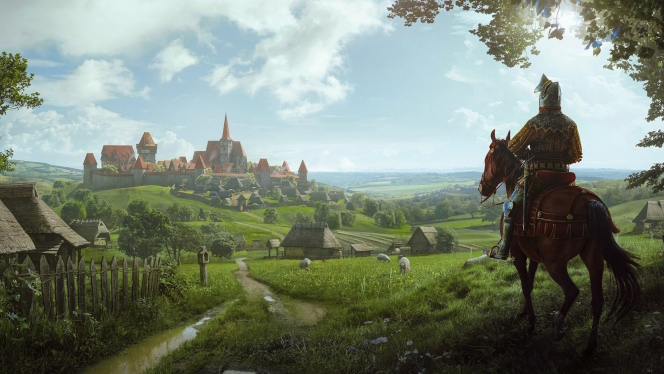
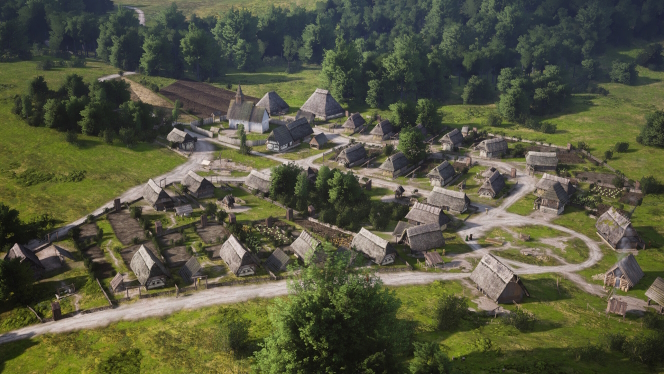

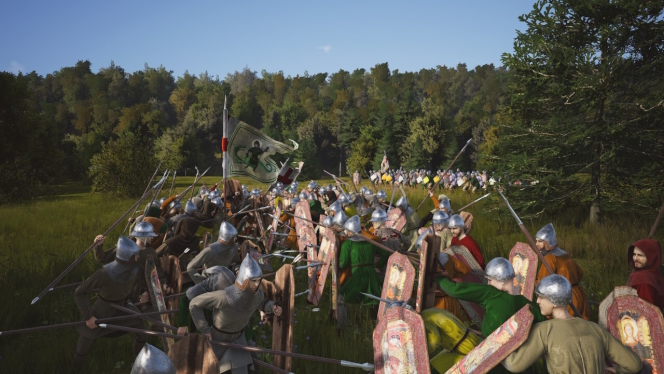
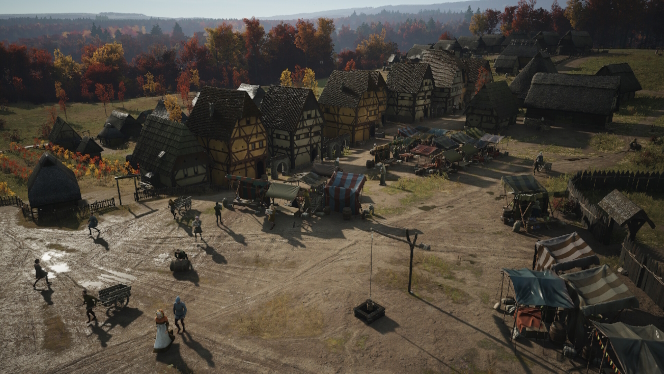
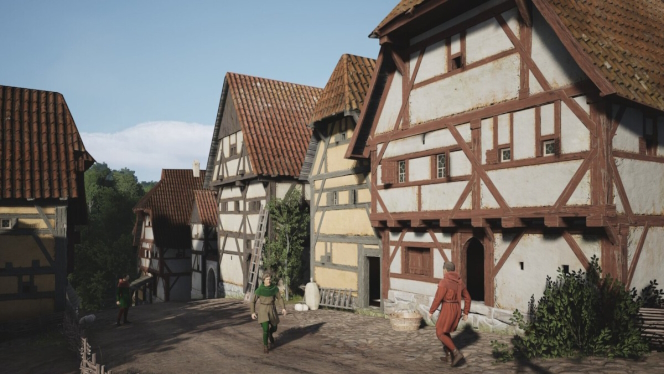














Leave a Reply